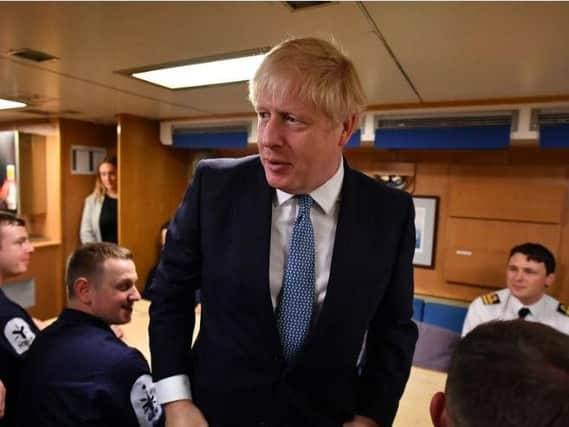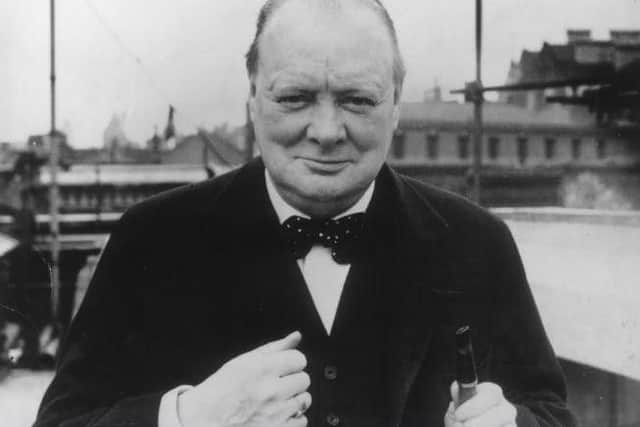Boris Johnson's Winston Churchill impression includes money problems: Bernard Ingham


But his first few days in office have shown he has a lot in common – good and bad – with our revered war leader. It is not for me to carp about Boris’s swashbuckling start to his tenure of No 10. The European Union, Jeremy Corbyn, John McDonnell et al have been asking for it for years. He has given it them with both barrels.
Advertisement
Hide AdAdvertisement
Hide AdCombined with his optimism and ebullience, he has quickly raised the nation’s spirits. If one man’s will can bring the EU to abandon its outrageous Northern Ireland backstop and put Marxism to flight then Boris is well on his way to being a hero in his own lifetime.


But there is one problem: money. Those who have read David Lough’s No More Champagne – a fascinating account of Churchill’s approach to money – will get the point.Lough details Churchill’s vast expenditure on cigars, champagne and gambling as if money grew on trees.
Advertisement
Hide AdAdvertisement
Hide AdSometimes, it seems, his wife, Clementine, was at her wits’ end. The truth is that this grandson of a duke lived on the edge of a financial precipice. Today he would not survive the scandal of his links with those who kept him more or less solvent, give or take a thousand or two.
My own observation of politics teaches me that from 1951 Churchill was a “wet” peacetime Prime Minister, exhibiting all the failings of the upper crust in approaching the working class.
This attitude – later expressed by Harold Macmillan’s “no sensible person directly challenges the Roman Catholic Church, the Brigade of Guards or the National Union of Mineworkers” – bred the trade union movement’s gross abuse of power that Margaret Thatcher had to end.
As you know, I doubt whether Old Etonians and our social elite have it in them to do what is best for the working man as distinct from just chucking money – his own money – at him.
Advertisement
Hide AdAdvertisement
Hide AdWhich brings me back to Boris. If he succeeds in achieving only half of what he has promised, he will go down in history as a political genius par excellence.
But at what cost? Sajid Javid, our new Chancellor, must be wondering where he is going to find the brass. Let us not forget that we are not yet running a budget surplus, though the £153bn deficit left by Gordon Brown has been substantially reduced over the last nine years.
In spite of this Boris has already made so many pledges that he will do well not to gobble up the £39bn that he claims a no deal on Brexit would liberate.
Presumably he sees this Brexit no-deal bonus on top of the so-called headroom of £26.6bn from lower than expected borrowing.
Advertisement
Hide AdAdvertisement
Hide AdHe is going to hire 20,000 more policemen by 2022 which should as a start run away with more than £1bn. Then we will have full fibre broadband by 2025 instead of the old target of 2033. Another £5bn? Who knows? Some estimates put it as high as £30bn.
Then he plans to level up spending per pupil in schools to £5,000 a year and possibly reverse education spending cuts. Anything for £50m to £5bn. Again, who knows?
Then he would raise the higher tax band to relieve those caught by fiscal drag from paying 40 per cent tax on anything over £50,000 a year and raise the level at which people start paying national insurance.
He has himself estimated the cost at £10bn though some of that might be offset by the higher tax take that paradoxically can come with tax reductions.
Advertisement
Hide AdAdvertisement
Hide AdHe also wants to cut corporation tax to boost business at an estimated cost of £3.1bn for every percentage point you knock off.
Then there is sorting out the NHS and the welfare of the elderly – no more waiting lists or selling homes to pay for care – and his vaulting ambition to improve “infrastructure” and the North, including a possibly £3bn trans-Pennine rail link.
By 2050 his UK would be a positive Shangri La – the biggest economy in Europe where our grandchildren would live “longer, happier and healthier lives” – but in view of our current £2 trillion (thousand billion) national debt, they would also be stung for his profligacy.
Boris exhibits wonderful energy, optimism and verve. But I do hope somebody has their eyes on the bill. It will, of course, be cheap at the price if he sees off Jeremy Corbyn.